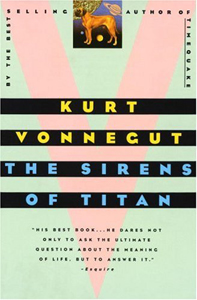
The Sirens of Titan
Author – Kurt Vonnegut
Paperback
Pages: 336
Publisher: Dial Press Trade Paperback
Release Date: 1959
ISBN-10: 0385333498
ISBN-13: 978-0385333498
My brother loves Kurt Vonnegut. Like really loves him. So, doing my older brotherly duty, I more or less ignored the fellow and his works. My brother would urge me to read them, and I would nod my head obligingly, all along just knowing just how much I could grind his gears.
He’s a clever brother, though, and so this past Christmas, wrapped up nicely under the tree was a copy of The Sirens of Titan, my brother’s favourite book by Vonnegut. Now, I might be a big enough asshole to ignore his suggestions, but not so much that I would neglect a Christmas gift. My hands were tied and my brother finally won, I picked up my first Kurt Vonnegut novel without really knowing what to expect.
Oh, how a fool I feel now.
At this point, Vonnegut needs little introduction. The Sirens of Titan was written in 1959 and nominated for a Hugo the following year. What’s amazing is how well The Sirens of Titan holds up, not only as a character study, but also as a work of Science Fiction. A common failing of older Science Fiction novels is that their science just doesn’t hold up in our modern world, but Vonnegut avoids this fate by skirting the specifics, more or less just telling the reader that it works because it works, and instead focuses on the travails of the characters as they are shuttled around the solar system.
The Sirens of Titan is very much a novel of misconceptions. One of Vonnegut’s 8 Rules for Writing Fiction is
‘Give your readers as much information as possible as soon as possible. To heck with suspense. Readers should have such complete understanding of what is going on, where and why, that they could finish the story themselves, should cockroaches eat the last few pages.’
and he follows it to a tee. Early in the novel, Malachi Constant (the protagonist) is told, very specifically, what will happen to him over the course of the story. And it does, without skipping a beat. The beauty of The Sirens of Titan is that though you know what will happen throughout, Vonnegut delivers on each promise in a twisted, roundabout way that has you constantly thinking back to those early pages when they thought they knew what was going on.
Vonnegut tackles the subject of free will and the purpose of life with aplomb, not afraid to tackle the tough subjects head on and even provide a smattering of unsettling answers. The characters in The Sirens of Titan – including the richest man in the world, a space travelling machine trapped in paradise, and a more-or-less omniscient god-like character – go through hell and back to prove Vonnegut’s point. Constant begins the novel as an unlikable prick, but as the pages turn that disdain crumbles away along with Constant’s luck and fortune, until there’s nothing but pity at the way that Constant’s been used by the various forces controlling the actions of our universe.
Perhaps the most surprising thing for me was the easiness of Vonnegut’s prose. For a novel that delves so deeply into what it means to be human, the chapters fly by without any hiccups along the way. Vonnegut captures so many of life’s lessons so succinctly that it’s hard to remember sometimes that the novel is more than just a rip-roarin’ adventure through space.
The mark of a truly timeless novel is it’s ability to stay relevant in the constantly shifting morass of culture and crisis that envelopes our world. Were The Sirens of Titan a new novel, and not fifty-odd years old, it would still be a timely, relevant piece of fiction. Its attempts at putting a face on the pitiless ebb-and-flow of civilization is remarkably telling in the face of the current crises we face (both economically and militaristically) and I expect this will continue to be the case for as long as we exist in this turpid state of constant war on Earth.
Vonnegut shows, through Rumfoord’s attempts at solving the Earth’s problems, that the answer is never easy, often leading to other equally pressing issues. Oddly enough, it’s only the morally corrupt Constant – A useless playboy, who wants nothing more than good liquor, wild women, and a life of leisure – who really seems to grasp the important things in life. And perhaps that’s the point of the whole novel – that there is no point, that life’s only purpose is simple to enjoy life.
I’ve often heard Vonnegut’s novels described as addictive and, frankly, I’m having trouble finding a better word to so accurately describe my experience with The Sirens of Titan. Compulsive and fiendish, my first foray into Vonnegut’s work holds promises of further adventures with the classic author. I ignored my brother’s advice for months, but I’m man enough to admit my mistakes. I was wrong, my brother was right. Kurt Vonnegut fairly earned his place among the literary elite.

What is truly incredible is how veiled Vonnegut’s ideas are here. He’s never really one to not speak his mind and although he never overtly preaches in fiction, the one thing you don’t get from THE SIRENS OF TITAN is a person to look up to. He disguises himself so well, that he basically brings up debate without showing favor to any one side.
I have never read Vonnegut either, he’s on my “when I get round to it” list.
Aidan, if you liked The Sirens of Titan, I can’t recommend strongly enough Slaughterhouse 5.It’s him masterpiece, I think, and it’s based on his real-life experiences on WWII
I second the reading of Slaughterhouse-5. It is one of the 100 best fictions of the 20th century in my opinion, plus I can’t help but like a guy who once attended my alma mater ;)